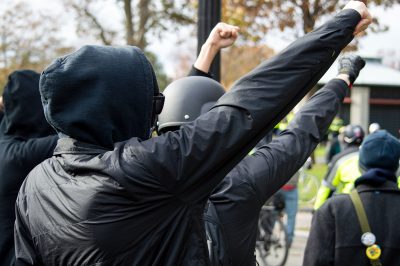
Boston University’s Free Speech Committee held its third student forum titled “Free Speech: Student’s Rights and Responsibilities” in the Conference Auditorium in the George Sherman Union Sept. 25 to create a discussion between faculty, students, staff and committee members.
Morrison formed two committees, the Free Speech Policy Committee and Free Speech Operations Committee, to “help develop a clear and consistent institutional voice on the issue of Free Speech on campus,” according to the Free Speech Committees’ website. The committees are holding forums throughout the semester to get student input in the policy development process.
The panelists were Jay Wexler, a professor of law on the Policy Committee, Kim Randall, a Title IX Coordinator and executive director of the Equal Opportunity Office and Larry Whitney, the university chaplain for community life who is on the Operations Committee. The event was moderated by Dean of Students Kenneth Elmore.
Wexler opened the forum by explaining the committee’s focus when creating the draft was to represent BU’s plan of action regarding free speech, demonstrations and controversial speech.
“The policy committee was charged with coming up with basically this draft statement that’s on the screen for you,” Wexler said. “In order to do that we met maybe half a dozen times during the spring.”
Wexler also mentioned a phrase in the draft statement that sparked debate among the participants, faculty and student alike. The draft statement states that, “The University embraces the guiding principle that the remedy for speech that is distasteful, emotionally and intellectually uncomfortable, or even offensive is not suppression of speech, but more speech.”
Whitney spoke following Wexler and Randall and brought up an issue being discussed on campus this week: Ben Shapiro coming to campus in November.
Shapiro is a conservative political commentator and public speaker invited to BU by the student group Young Americans for Freedom. His potential visit is creating tensions on campus, including a change.org petition to ban him from speaking endorsed by six different BU clubs and organizations.
During the discussion part of the event, which lasted about an hour, many comments were brought to the attention of the panelists regarding Shapiro’s presentation. This included a student reading tweets from Shapiro including, “I believe gender dysphoria is a mental disorder,” and “As a religious Jew, I think homosexual activity is a sin.”
The panelists took most comments without response, taking notes and listening to the students and their opinions. Wexler and Elmore acknowledged the imperfections in the draft statement, including vague wording and the exclusion of the encouragement of dialogue among students in the statement itself.
“So what we’re effectively doing here is putting our commitment to freedom of speech on par with our commitment to diversity, equity and inclusion. And that doesn’t resolve the tension, right?” Whitney said in his opening statement. “But it says that we’re committed to holding these two things together, figuring out in the messiness of the details, how to do this well, but we make a good faith effort to do it as best as possible.”
Dana Hammarstrom, a senior in the College of Arts and Sciences, said she thinks the conversations stemming from these issues involving Shapiro and other types of free yet potentially offensive speech on campus won’t be solved by the free speech statement soon to be implemented by BU.
“The real change isn’t going to come from the policy, I think the real change is going to come from the students choosing to have more conversations with each other,” Hammarstrom said. “I hope students decide that they want to learn from each other because the only way to learn is to listen to things that you haven’t heard before, even if it means they’re challenging.”
The next and final two forums this fall will be held on Oct. 2 and 16. More information can be found on the Free Speech Committee’s website.



















































































































